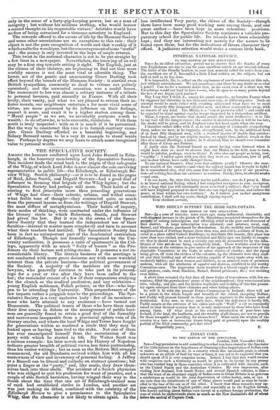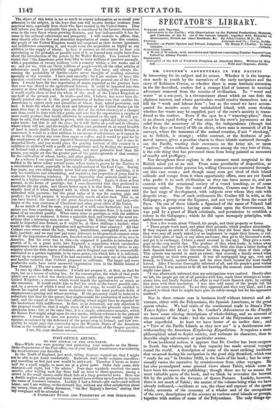INDIAN CORN.
TO THE EDITOR OF TI1E SPECTATOR.
London, 24th November 1845.
Sin—I beg permission to add something to what you have stated in the Spectator of the 15th instant on the importance of obtaining a free importation of Indian corn or maize. Living, as you do, in a country where this invaluable grain is almost unknown as an article of food for man or beast, it was not to be expected that you should speak of it in very sanguine terms. Indeed, I fear that you would receive with suspicion such a testimony as would be given in its favour by any person who has resided long in those countries where it is cultivated with success, such as the United States and the Australian Colonies. My own impression, after visiting New Zealand, New South Wales, and several Spanish colonies, is this— that the want of an abundant supply of Indian corn in Great Britain is as grievous a misfortune as would be the total deprivation of either barley, oats, or rye. I am sure that the inhabitants of any of those places would just as soon be recon- ciled to the loss of the one as of the other. 1 know that these remarks may ap- pear exaggerated to the English public, and especially so to the English farmer, who knows nothing about Indian corn except as a curious foreign production, the uses of which he understands about as mach as the New Zealanders did of wheat before the arrival of Captain Cook. The object of this letter is not so much to convey information as to recall tour attention to the subject, in the hope that you will receive further evidence from practical men, especially from those who have resided in the United States. They will inform you how invaluable this grain is considered by the farmers themselves, even in the very finest wheat-growing districts, and how indispensable it has be- come to the national subsistence and prosperity. I will venture to affirm, that, very shortly after the free and abundant importation of maize into this country, the people of the United Kingdom would feel surprised at their former ignorance and indifference concerning it, and would value the acquisition as highly as any addition to the supply of wheat. In fact, it amuses an old colonist to hear you speculating on the probable or possible taste of it, as learned men might have done about the introduction of the potato by Sir Walter Raleigh. You yourself have stated that "the Americans grow from fifty to sixty millions of quarters annually, with a population of twenty millions "—in a country within a few weeks sail of us; and yet we with our thirty millions of people—with all the other articles of subsistence much less plentifully supplied than they have, and always dis- cussing the probability of famine—have never thought of availing ourselves specially of this resource. I have said specially; for I am anxious to have this question considered on its own merits, irrespective of the general one of the Corn-
I would have the free importation of maize regarded as the greatest boon
that ever was offered to the agricultural interest. It could be imported into this country at three shillings a bushel; and thus—to say nothing of the peasantry— it would enable them to feed the whole of the stock of the United Kingdom at one-half of the present cost. In truth—and this I believe, has never been dis- tinctly: pointed out—it is this great production Of Indian corn that enables the Americans to export such vast quantities of wheat, flour, salted provisions, and lard. It feeds the whole of the stock and labourers of the United States (at the same time that it enters largely into the diet of the richer classes) at a cheaper rate than could be done with other grain, and sets free for exportation a surplus of more costly, produce that would otherwise be consumed on the spot. It will per- haps be said, that wheat might be grown, with the same capital and labour, on the same lands: but this is not the case; for it will thrive on a soil and in climates where wheat will not; and the weight of Indian corn produced on an equal breadth of land is nearly double that of wheat. At all events, so far as Great Britain is concerned, it would be a clear addition to our means of subsistence, as it cannot be grown in this country any more than sugar or coffee; and it would be paid for by the employment of a few more hundred thousand manufacturers. Let it once be imported freely, and you would place the grazing interest of this country in a condition to undersell with a profit all competitors; and, by feeding the peasantry of Ireland with a cheaper, more nutritious, and more palatable food than the potato, you might set free the greater part of the potato-grounds of that country for the cultivation of wheat, barley, and other grams.
As a witness I can speak more particularly of Australia and New Zealand. I
resided in the latter colony several years, where maize is grown by the Natives to a considerable extent, especially in the neighbourhood of the East Cape. Daring four years, my own riding-horses never had any other grain. If anything it is only too nutritious and stimulating, and requires a due proportion of green food to moderate its fattening tendency. It was impossible that animals could be pre- served in a higher condition both of strength and activity. I gave it them at first ground, in the forms of porridge; but I soon discovered that they preferred to masticate the dry grain, and throve better upon it in that form. The cows were equally, fond of it when indulged with it, which was not often necessary with unlimited wild pastures: but the great value of it was for rearing pigs and poultry; for which purpose it unquestionably excels all other food. This is, as you have hinted, the secret of the great American trade in pigs and lard,—the origin of the very existence of Cincinnati and other great cities of the Union. As an article of food for man, you speak of it with some hesitation: but I can assure you from experience, that, when mixed with wheaten flour, it is made into bread of an excellent quality. When eaten alone as porridge, or with the addition eta little sugar or molasses, it forms a palatable food, and certainly the most nu- tritious that a labouring roan can eat. Suppose, Mr. Editor, that such an article could be imported into Ireland, as it might be, at three shillings a bushel; what would be the effect on the population and agriculture of that country? All that Cobbett ever wrote about the lazy, watery, mnutritions, corraptibleroot, is now fully justified; and we may now pay some deference to his practical common sense view of the importance of Indian corn founded on his own perceptions of its uses in America. But his error was in this—he supposed it possible to introduce the growth of it, on a great scale into England; a supposition which numberless experiments have shown to be unfounded. In fact, it will scarcely thrive in any aotmtry above the 40th degree of latitude, and in England can only be snecessfally cultivated as a garden vegetable, to be eaten green,—in which form it is delicious, served up as asparagus. Even if he had succeeded, itwas only one of the smaller and hardier varieties that Cobbett proposed to cultivate. The larger and more productive sorts have never answered expectation even in the Middle Island of blew Zealand. [The one nearer the Pole.]
To sum up these diffuse remarks. I would not propose it, at first, as food for
man, but as a means of setting free, for his consumption, the whole of that grain -which now goes to feed the stock—the horses, cattle, pigs, and poultry—of the _United Kingdom; a resource which would benefit the agriculturist as much as the consumer. It would enable him to feed his stock at the lowest possible rate; and, by a process of which I need not detail the steps, he would be enabled to throw his capital and labour more exclusively into the most profitable fields of employment—grazing and wheat-growing. If the peasantry could be induced to substitute this food for the potato, they might double the production of corn in Ire- land; and the repeal of the Corn-laws affecting wheat might then be regarded by the landowners with indifference. In fact, as an economist, my only objection to the proposal would be, that it might stave off for a term the pressure upon those obnoxious laws: but, at the same time, it is a simple, substantive measure, which Sir Robert Peel might adopt upon its own merits, without reference to the general question. I wonder he does not perceive how perfectly this would supply the vacuum occasioned by the deficiency of the potato crop in Ireland; and howirre- sistibly he might urge this concession upon the Western States of the American Union as the condition of a 'List and amicable settlement of the Oregon question.



























 Previous page
Previous page